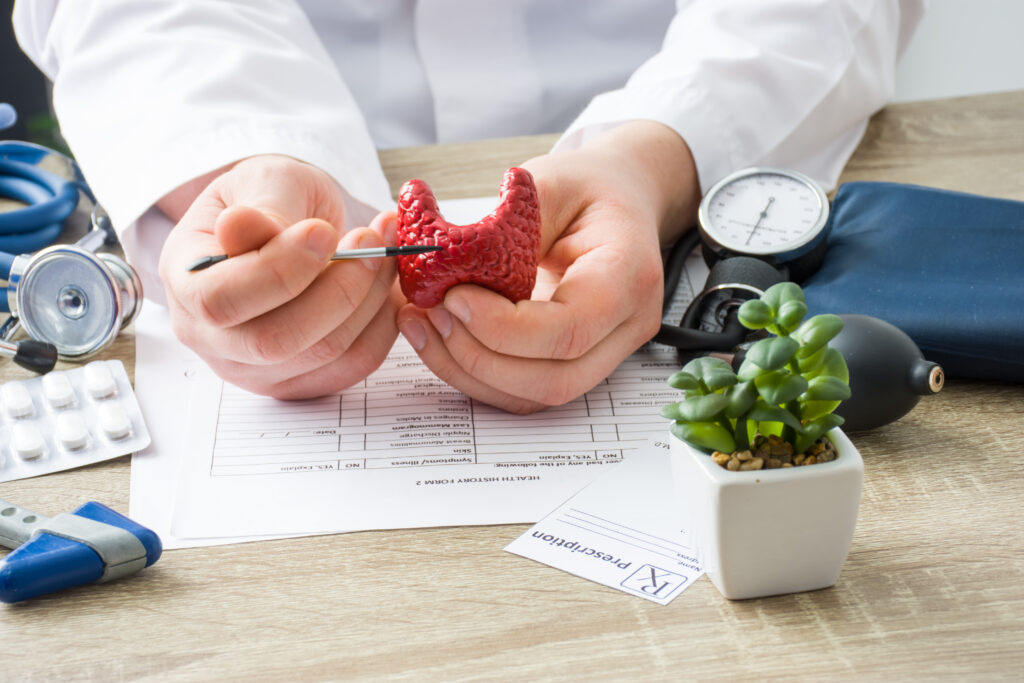Imagine waking up every day feeling exhausted, struggling with unexplained weight gain, or constantly dealing with cold hands and feet. These symptoms might not just be a part of getting older—they could be linked to thyroid health. Your thyroid is a small but mighty gland that plays a crucial role in regulating metabolism, energy levels, and overall well-being. When it’s out of balance, it can impact everything from your weight to your mood and even your heart health.
Dr. Terri recently sat down with Dr. Johnny Peet, a board-certified gynecologist and integrative medicine expert, to discuss thyroid health in detail. In their conversation, Dr. Peet shared his personal experience with thyroid cancer, saying:
“I was 30 years old when I noticed a lump in my neck while shaving. Sure enough, it was thyroid cancer. After undergoing a thyroidectomy and radiation, I was left without a functioning thyroid. Like many others, I was prescribed synthetic T4 medication, but I never truly felt the same again.”
Are Thyroid Conditions Hereditary?
Genetics play a major role in thyroid function. According to the National Library of Medicine, up to 67% of circulating thyroid hormone and TSH levels are genetically determined. If a close family member has a thyroid disorder, there’s a higher chance of developing one as well. However, environmental factors, diet, and stress also contribute significantly to thyroid health.
“Your genes may load the gun, but your environment pulls the trigger. Just because thyroid conditions run in your family doesn’t mean you are doomed—you can take proactive steps through lifestyle changes and proper hormone management.” – Dr. Peet
What Does the Thyroid Do?
Your thyroid gland regulates numerous bodily functions by producing and releasing essential hormones. These hormones impact metabolism, heart rate, energy production, and even mood. When your thyroid isn’t functioning properly, it can throw off balance in multiple areas of health, leading to symptoms like fatigue, depression, hair loss, or digestive issues.
“Thyroid hormones influence every single cell in the body. When your thyroid is underactive, it’s like running on low battery—everything slows down, from digestion to brain function to your ability to burn fat.” – Dr. Terri
Where is the Thyroid Gland Located?
According to the Cleveland Clinic, the thyroid is a small, butterfly-shaped gland located at the front of your neck, just below the Adam’s apple. Despite its small size, it has a massive impact on bodily functions. Its strategic position allows it to regulate various metabolic processes by releasing hormones directly into the bloodstream.
Will Thyroid Issues Cause Weight Gain?
Weight gain is a common concern for those with thyroid dysfunction. An underactive thyroid (hypothyroidism) slows metabolism, leading to weight gain despite diet and exercise. On the other hand, an overactive thyroid (hyperthyroidism) can cause unintended weight loss.
“If you’re eating right and exercising but still struggling with weight gain, your thyroid could be the missing piece of the puzzle.” – Dr. Peet
Thyroid Nodules: Should You Be Concerned?
Thyroid nodules are growths that develop within the thyroid gland. According to the Mayo Clinic, most thyroid nodules are benign and don’t cause symptoms. However, a small percentage can be cancerous.
“A lot of people have thyroid nodules and don’t even know it. The key is early detection. If you feel any lumps or experience difficulty swallowing, don’t ignore it—get checked.” – Dr. Peet
Thyroid Cancer: What You Need to Know
Thyroid cancer is relatively rare but can occur in different forms. The American Cancer Society classifies thyroid cancer into four main types: papillary, follicular, medullary, and anaplastic. While some types are highly treatable, early detection is crucial for successful outcomes.
Hyperthyroidism and Thyroid Disease
Hyperthyroidism occurs when the thyroid produces excessive hormones, leading to symptoms like rapid heartbeat, weight loss, and anxiety. It’s often caused by autoimmune conditions like Graves’ disease.
“Many people don’t realize that too much thyroid hormone can be just as problematic as too little. If you’re feeling jittery, anxious, or experiencing heart palpitations, it’s worth getting your thyroid checked.” – Dr. Terri
Hashimoto’s Disease: An Autoimmune Condition
Hashimoto’s disease is an autoimmune disorder that leads to hypothyroidism. The National Institute of Health explains that Hashimoto’s occurs when the immune system attacks the thyroid, causing inflammation and impaired hormone production.
“Hashimoto’s is one of the most underdiagnosed thyroid conditions. If you have symptoms of low thyroid but normal labs, you may still have Hashimoto’s—especially if there are high levels of thyroid antibodies.” – Dr. Peet
Symptoms of Low Thyroid Function
If you’ve been experiencing unexplained weight gain, fatigue, dry skin, constipation, hair thinning, or mood changes, your thyroid could be the culprit.
“I see patients every single day who are told their thyroid is ‘normal’ when it’s really not optimal. There’s a difference.” – Dr. Peet
Taking Control of Thyroid Health
Addressing thyroid imbalances goes beyond medication. Nutritional support, hormone optimization, and lifestyle changes all contribute to optimal thyroid function. Reducing stress, maintaining a nutrient-dense diet, and incorporating regular exercise can all support healthy thyroid function.
Taking control of your thyroid health starts with getting the right testing and treatment.
Find a provider today to get a comprehensive thyroid evaluation and take the first step toward better health.





